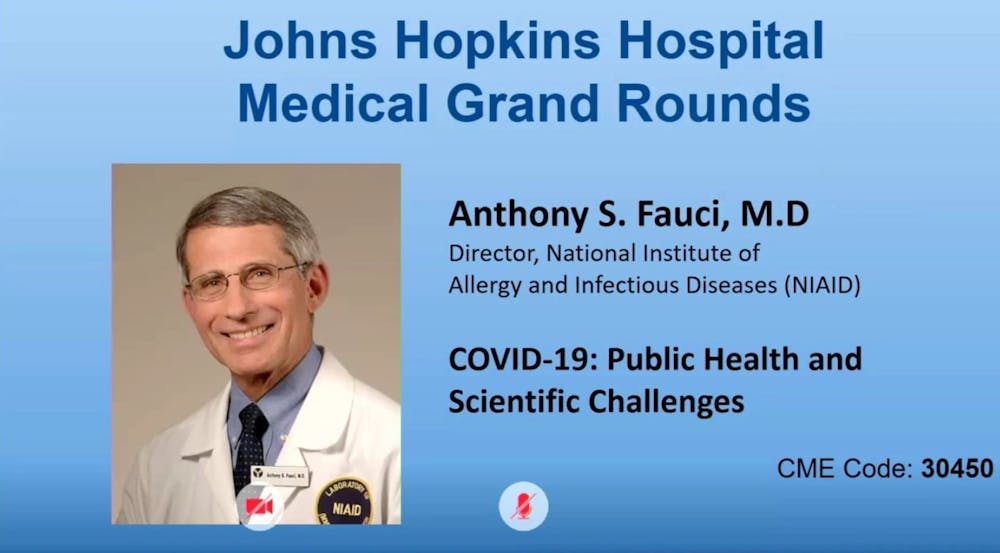In late January, within days of the identification of SARS-CoV-2, Dr. Anthony Fauci co-wrote a paper titled “Coronavirus Infections — More Than Just the Common Cold.”
“I chose the title not because I wanted to be facetious, but because I wanted to point out... that we’ve had decades of experience with coronaviruses over the years,” he said.
Fauci speaks not just about the history of the field of infectious diseases, but also from personal experience. He has led the National Institute of Allergy and Infectious Diseases of the National Institutes of Health (NIH) for more than three decades and is considered the nation’s top infectious disease specialist.
He shared his expertise in a keynote address at the latest Medicine Grand Rounds as part of the “COVID-19 Symposium at Hopkins: Navigating the pandemic when effective vaccines are in the toolbox” on Nov. 20.
Fauci opened his talk with a reminder that the current pandemic is the third human coronavirus pandemic that we have experienced. The first two were also in the 21st century: the 2002 outbreak of Severe Acute Respiratory Syndrome (SARS) and the 2012 outbreak of Middle East Respiratory Syndrome (MERS).
Although SARS and MERS barely affected the U.S., in the current pandemic, the U.S. is the worst-hit country in the world.
The high rates of infection, according to Fauci, can be attributed to high levels of mobility; in mid-March, a higher percentage of the U.S. population continued with in-person work activities compared to European countries. Small get-togethers with friends and family may also be to blame.
“I call up many of my colleagues throughout the country to get a feel of what is going on in the trenches,” he said. “We have come to see that in small gatherings of friends and family where people feel comfortable to take masks off or gather inside because it is cold... the risk [of infection] is substantial because asymptomatic spread does occur.”
Fauci described asymptomatic spread as a surprise of the pandemic. About 40-45% of infections are due to transmission by asymptomatic people. This transmission is one reason that the Centers for Disease Control and Prevention (CDC) advised people not to gather for Thanksgiving.
While the high rates of transmission are concerning, several COVID-19 vaccines are in the development pipeline. Although the newly developed vaccines have demonstrated high efficacy, Fauci reminded the audience that COVID-19 will likely not be eradicated. People typically don’t exhibit long-term immunity to coronaviruses, like the common cold. Instead, he expects that people will need to get vaccine boosters periodically. Current vaccine trials will monitor patients up to two years to examine the durability of the antibody response and to determine the timeline of vaccine boosters.
Dr. Andrea Cox, a professor at the School of Medicine, expressed her concern that the current focus on developing vaccines for COVID-19 hinders the development of treatments for other diseases.
“Will COVID-19 vaccine design strategies potentially affect the development of vaccines against other major global viral killers like HIV and the Hepatitis B virus infections?” she asked.
Fauci explained how early in the pandemic, the NIH decided to allocate major investments toward the development of an mRNA vaccine. The investments were criticized given the novelty of the technique. But the investments paid off. Within 63 days of uploading the sequence of the SARS-CoV-2 virus to a database, not one but two companies, in two separate trials, verified the efficacy of a mRNA vaccine.
“I think that mRNA-based vaccines and other avant-garde technologies are here to stay,” he said. “And I think it’s going to help us in developing vaccines against other diseases, including HIV.”
Dr. Annie Antar, assistant professor in the School of Medicine, pointed out that the vaccines currently in trial have not been tested or approved for children. Children are a vulnerable population, and special care has to be taken to protect them from toxicity and other adverse effects. Vaccines are approved for children only after it is fully approved for adults. Fauci explained that there would be a delay, but he didn’t expect it to be a long one.
The discussion shifted to vaccine distribution. Dr. Thomas Quinn, director of the Hopkins Center for Global Health and a member of Fauci’s lab, asked about the state of vaccine distribution efforts across the rest of the world.
Fauci explained that companies like Moderna, Pfizer and Johnson & Johnson have already pledged to make billions of doses of vaccines, enough for nations outside the United States. He also stressed that he believes that the U.S. is duty-bound to contribute to vaccine distribution efforts across the globe.
In particular, he highlighted the COVAX initiative led by the World Health Organization, the European Commission and France. The U.S. is not currently contributing to the program, but Fauci hopes that will change.
“We as a nation have a moral responsibility to be a part of the process of making sure that people get vaccinated regardless of where they were born,” he said. “Since it’s a global problem and we are part of the global community, we have a responsibility.”
In his paper “Emerging Pandemic Diseases: How We Got to COVID-19,” Fauci reflects on how pandemics have been a part of human history and always will be. To prevent widespread devastation in the next outbreak, he believes that we must take the lessons from this historic pandemic to heart.
“Let us maintain our corporate memory and remember the need for pandemic preparedness as we get through this ordeal,” he said. “Then we can look forward to preventing this from happening again.”





